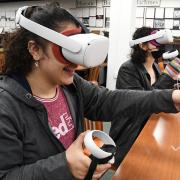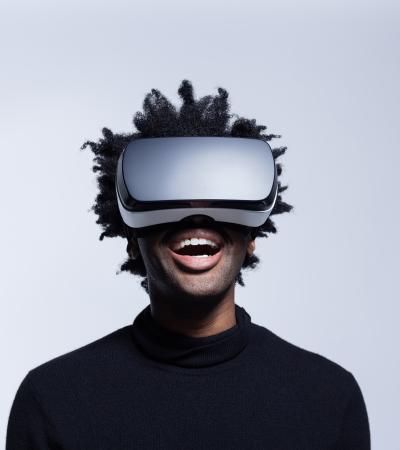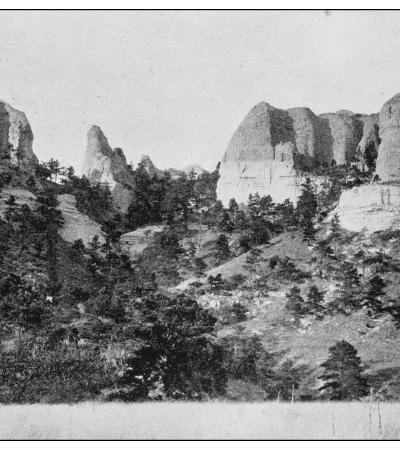Humanities topical immersion programming engages college communities regarding social issues. The immersions consist of a three-pronged approach of a VR experience, a film screening and an online/in-person discussion.
Advanced Planning
The goal of the topical immersions was to foster the development of skills in perspective-taking and/or empathy for others, particularly those in marginalized groups. Although the programming was labor intensive, very little planning (only one month) was needed to launch the programming.
Research was needed to find both a virtual reality experience and a film that were topic specific. The attendants had to learn the VR technology, as well as know the VR app well enough to predict when/where a participant may have problems in the app.
For the film screening, public performance rights had to be secured. The biggest hurdle to the topical immersion was scheduling the events and marketing to the appropriate participants.
Marketing
The Rider University Libraries marketed the event through a Springshare Research Guide, the campus ad television, fliers, emails to distribution lists and on the library website. The library also direct-marketed the immersions to teaching faculty who had a course syllabus description that matched the immersion topic. Our findings were that the direct marketing approach was the most successful approach to ensuring that the students would take part in the topical immersions.
Budgeting
Rider University received the American Rescue Plan: Humanities Grants for Libraries grant, which was for $10,000. To support the topical immersion programming, the libraries purchased seven Oculus Quests. Additionally, nearly $2,500 was spent for public performance rights for media related to the virtual reality event.
Although Rider University Libraries was fortunate to secure this grant, the humanities topical immersions could be performed with one Oculus Quest 2, which is about $400. Oculus Quest apps for a humanities topical immersion may be found for free using the Oculus for Good website.
Libraries may also share the devices to cut back on cost.
Day-of-event Activity
With each VR event, an attendant had to set up the Oculus Quest 2 headset. Setup of the Oculus entailed: setting up the guardian, launching the app, testing the app, casting the headset to a laptop and then going to the laptop to ensure it was casting. Casting was used to help participants with any technical issues. A total of 63 VR sessions were available for registration with each of the six topical immersions. Additionally, Rider University Libraries did face disconnected students. Although students were interested in the VR experience 20% did not show up after registering.
The film screenings required less staffing. All film screening participants had to register with Zoom prior to the event. On the day of the event, the film screening registrants were sent the Zoom link. The film was launched and the host shared their screen. After the film screening was complete, the hosts engaged participants in a discussion about the film
Program Execution
The topical immersion consisted of a virtual reality (VR) experience, a film screening, and a discussion. The topics chosen for the immersions consisted of: Holocaust/Jewish Studies, Black People’s Mobility, People without Housing, The Refugee Experience, and Racial Injustice.
The virtual reality experience was a one-on-one experience, consisting of the participant and the VR attendant. The purpose of the VR attendant is to ensure that the technology was not a barrier to the VR immersion. The film screenings were able to attract the most participants and only require two people to host the screening. The online discussion received no participation, so the discussion occurred after the VR experience and the film screenings.
The programs received the following feedback from participants: the program: created a "visceral understanding"; [it allowed me to] “relate intellectually and emotionally to the content”; "VR offers the perspective of being present and engaged. There is no way away from the content. VR allows more intimate connections to the content, especially for people who do not share the same experiences." Finally, all who participated in any of the topical immersions rated the experience as “Excellent” and they were either “Extremely likely” or “Somewhat likely” to attend another event.
In order to evaluate whether the topical immersion programming met the goals of the programming participants, Rider University Libraries surveyed participants with both closed- and open-ended questions. The surveys were brief and consisted of only 5-10 questions.
Advice
Talk to other libraries that are engaging in this type of programming. Also, keep in mind that supporting participants in virtual reality is more difficult than expected. Support requires almost expert level understanding of the virtual reality app and an understanding of the technology. Be mindful that not everyone will want to try virtual reality, which is why you may want to have different approaches to engage the community in a topic.
To learn more about this program, see the Programming Librarian interview with Sharon Whitfield.



